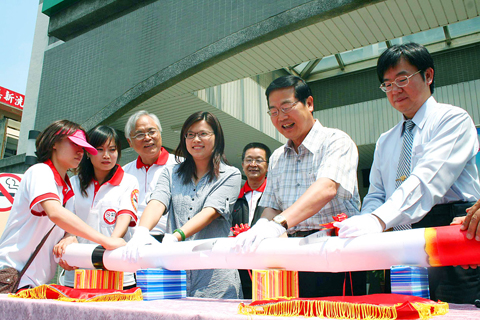The health and welfare surcharge on tobacco products will be increased from NT$10 per pack to NT$20 per pack starting today.
Chao Kun-yu (趙坤郁), director of the Bureau of Health Promotion said retail stores are allowed to sell off their existing cigarette stocks without asking customers to pay the extra NT$10 surcharge.
The surcharge increase will raise the average per-pack price for cigarettes to between NT$55 and NT$70, depending on the brand.

PHOTO: LIN MING-HUNG, TAIPEI
According to an estimate by Chao, the new measure is expected to boost annual revenues from the health and welfare surcharge from NT$20 billion (US$615 million) to between NT$32 billion and NT$36 billion.
Chao said the DOH would use 4 percent, or NT$1.39 billion, of the revenues from the surcharge as subsidies to help 470,000 people obtain national health insurance. The Bureau of National Health Insurance will receive 70 percent of the surcharge revenues and will spend NT$10 billion to meet its financial shortfall, and the rest in various areas such as cancer prevention, raising the standards of medical services and treatment of rare diseases.
Meanwhile, the “high-season” summer rates policy adopted by the Taiwan Power Co (Taipower, 台電) will also take effect starting today.
On average, a typical local family uses around 421 kwh per month during the summer, which translates to an additional NT$102 in electricity bills per month.
According to the state-owned company, the new policy is aimed at encouraging the public to conserve energy during the four months between this month and September.
Under the new rates, households using between 110 kilowatt hours (kwh) and 330kwh per month will be charged at NT$3.02 per kwh (up from NT$2.68 in other seasons). They will be charged NT$4.05 per kwh (up from NT$3.27 in other seasons) if electricity usage is between 331kwh and 500kwh per month.
Those using between 501kwh and 700kwh per month will be charged at NT$4.51 per kwh (up from NT$3.55), while any usage higher than 701kwh per month will be charged by NT$5.1 per kwh (up from NT$3.97).
But consumers that use less than 110kwh per month will still pay NT$2.1 per kwh.

The first global hotel Keys Selection by the Michelin Guide includes four hotels in Taiwan, Michelin announced yesterday. All four received the “Michelin One Key,” indicating guests are to experience a “very special stay” at any of the locations as the establishments are “a true gem with personality. Service always goes the extra mile, and the hotel provides much more than others in its price range.” Of the four hotels, three are located in Taipei and one in Taichung. In Taipei, the One Key accolades were awarded to the Capella Taipei, Kimpton Da An Taipei and Mandarin Oriental Taipei. Capella Taipei was described by

EVA Airways today confirmed the death of a flight attendant on Saturday upon their return to Taiwan and said an internal investigation has been launched, as criticism mounted over a social media post accusing the airline of failing to offer sufficient employee protections. According to the post, the flight attendant complained of feeling sick on board a flight, but was unable to take sick leave or access medical care. The crew member allegedly did not receive assistance from the chief purser, who failed to heed their requests for medical attention or call an ambulance once the flight landed, the post said. As sick

The Taichung District Court yesterday confirmed its final ruling that the marriage between teenage heir Lai (賴) and a man surnamed Hsia (夏) was legally invalid, preventing Hsia from inheriting Lai’s NT$500 million (US$16.37 million) estate. The court confirmed that Hsia chose not to appeal the civil judgement after the court handed down its ruling in June, making the decision final. In the June ruling, the court said that Lai, 18, and Hsia, 26, showed “no mutual admiration before the marriage” and that their interactions were “distant and unfamiliar.” The judge concluded that the couple lacked the “true intention of

INDUSTRY: Beijing’s latest export measures go beyond targeting the US and would likely affect any country that uses Chinese rare earths or related tech, an academic said Taiwanese industries could face significant disruption from China’s newly tightened export controls on rare earth elements, as much of Taiwan’s supply indirectly depends on Chinese materials processed in Japan, a local expert said yesterday. Kristy Hsu (徐遵慈), director of the Taiwan ASEAN Studies Center at the Chung-Hua Institution for Economic Research, said that China’s latest export measures go far beyond targeting the US and would likely affect any country that uses Chinese rare earths or related technologies. With Japan and Southeast Asian countries among those expected to be hit, Taiwan could feel the impact through its reliance on Japanese-made semi-finished products and